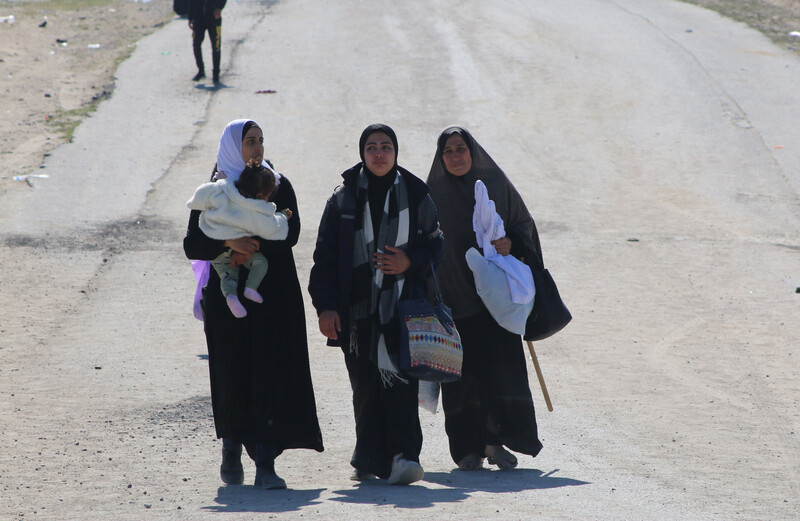The Electronic Intifada 21 June 2024

People have been forced to walk for long distances to seek safety, carrying their possessions and children. Here near Khan Younis on 5 March.
APA imagesAlaa, 31, used to live in Gaza, when it was merely a besieged city weighed down by isolation.
She married an Egyptian, Ahmed, and traveled with him to Egypt, spending 10 years without seeing her family in Gaza due to financial constraints.
Alaa and her husband spent much of their money trying to conceive, undergoing seven expensive in vitro fertilization procedures, all of which failed.
But God had plans for Alaa’s happiness. On the eighth attempt, she gave birth to twins, Hassan and Hussein.
Alaa’s and Ahmed’s joy was indescribable, and they wanted to share this happiness with their families. Alaa decided to travel back to Gaza to visit her family.
Alaa embarked on the torturous journey with her two-month-old twins through the Rafah border crossing. She arrived in Gaza on 5 October. She had not informed her family, intending to surprise them.
She found the home only with some difficulty. After ten years, the neighborhood had been transformed, with new high-rise buildings and a beautiful garden.
Displacement
Alaa was warmly welcomed by her family. Her father nearly fainted, her mother cried with joy, and her sister screamed loudly in delight.
But their joy was short-lived. On 7 October, the Israeli military attacked Gaza. The family at first decided to stay in their home despite the relentless shelling. Alaa’s father preferred to stay in Gaza and did not heed the Israeli army’s calls to evacuate to the south, as he did not know anyone there who could take them all in.
Alaa had to move from house to house seeking safety, eventually deciding to stay in al-Shifa hospital. It was not a permanent refuge. Days passed with difficulty as hunger and a lack of milk and diapers for her twins along with exorbitant prices took their toll.
In Egypt, Alaa’s husband tried in vain to get the family out. Alaa, meanwhile, endured much anguish trying to provide food for her twins and herself. Her family was in the same position and in March, when the situation got particularly acute, Alaa’s brother, Muhammad, decided to go to Kuwait roundabout to get flour for his sister and her children.
He was shot by the army and died trying to bring a bag of flour to the family.
Later that month, after six months of suffering for Alaa and their babies, Ahmed managed to get the names of his immediate family members on the travel list of the Egyptian Ministry of Foreign Affairs.
The journey to the Rafah crossing in Gaza’s south was fraught with danger, but Alaa knew she had no other choice. She set out to walk south, a nine-hour journey under the scorching sun, pulling her children in a cart over rough, sandy roads with deep holes.
Safety
At one point, she stumbled into a hole and could not lift the cart out. It was not safe to stop for long, so Alaa left the cart and carried Hassan and Hussein on her shoulders, her frail body moving through sheer force of determination.
On the way, she saw horrifying scenes of dead people and animals on the roadside and bodies being eaten by cats and dogs. Her heart was wrenched with pain.
When Alaa reached the army checkpoint, she faced new challenges. The soldiers initially refused to let her pass. But after Alaa persisted and showed the Egyptian passports of her children, they allowed her through.
Alaa continued walking until she finally reached the crossing, having walked some 35 kilometers from Gaza to Rafah.
When she crossed the border, she was exhausted and tired, but her heart was filled with hope. She reached her husband after a strenuous journey and embraced him. He did not recognize his children at first, as the babies he had left at 2 months old were now crawling and talking.
Alaa and her twins survived, but her heart remained divided between the joy of their survival and the sorrow for her elderly father and sick mother left behind in Gaza.
Asmaa Habib lives in Gaza.



